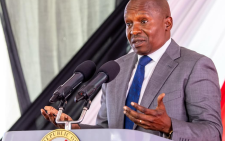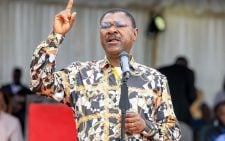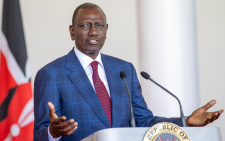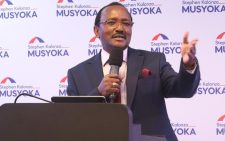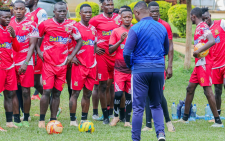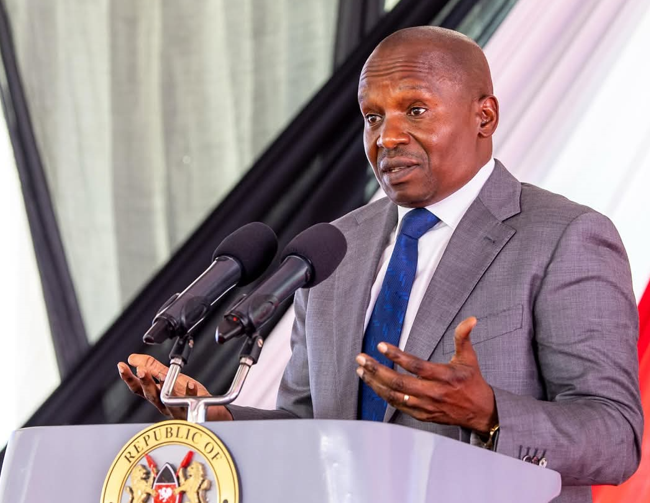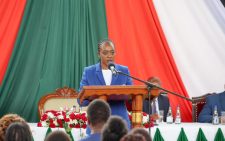Catholics frown at women priests, same sex doctrines

The just concluded Catholic Synod on Synodality in Rome has slammed doors on the agitation for same sex marriages and ordination of women as priests in a move that is being perceived as a major win for the African church.
Mombasa archbishop Martin Kivuva who attended the gathering on behalf of the Kenya Conference of Catholic Bishops (KCCB) hailed the outcome of the synod as a milestone for the church in the wake of various challenges brought about by modernity.
“We cannot subvert the doctrinal and moral tradition of the Church to please the world. We look at the cross of Christ — glorious, yes, but a cross nonetheless,” he told said.
Archbishop Kivuva who was accompanied to the gathering by his Nyeri counterpart Anthony Muheria, said they had presented views from the Kenyan Catholics at the meeting.
Archbishop Kivuva however, while agreeing that the issue of homosexuality was not considered as a pressing matter, downplayed the question of whether the meeting was a major victory for the African church.
“We were not competing but looking at the direction in which the church should go through consultation and consensus. It is good that at the end of the day, we were not distracted by people who were pushing their selfish agenda with the interest of some multinational companies in their minds,” said the archbishop.
Pope Francis ended the gathering of Catholic bishops and laypeople without making conclusive decisions on thorny issues such as homosexuality, women ordination, celibacy and collegiality that had threatened to divide the church.
Observers now say that whereas clerics from the third world. Africa, Asia and Latin America have left the synod a happy lot, their counterparts from Europe, US and other developed nations left quite dissatisfied after their calls for issues such as same sex unions was hardly mentioned.
On the issue of women ordination, the meeting only called for “urgent” need to guarantee fuller participation of women in church governance positions and called for research on allowing women to be deacons to be released within a year.
Gay community
But the meeting didn’t take decisive action on that issue, as it backed off any specific calls for welcoming LGBTQ+ Catholics despite Pope Francis’ repeated outreach to the gay community and willingness to consider blessing same-sex couples.
After a month of closed-door debate, Francis’ meeting on the future of the Catholic Church ended late Saturday with the approval of a 42-page text on a host of issues that will now be considered at a second session next year. None of the proposals is binding, and they are merely offered for Francis to consider.
Francis called the synod over two years ago as part of his overall reform efforts to make the church a more welcoming place, where lay people have a greater say in the life of the church.
The process, and the two-year canvassing of rank-and-file Catholics that preceded it, sparked both hopes and fears that real change was afoot.
Some progressives, particularly those from Europe and USA, had hoped the gathering would send a message that the church would be more welcoming of LGBTQ+ people and offer women more leadership roles in a hierarchy where they are barred from ordination. Conservatives emphasized the need to stay true to the 2,000-year tradition of the church and warned that opening debate on such issues was a “Pandora’s Box” that risked schism.
Decision-making process
But at the end of the meeting, the gathering made its strongest proposals concerning women though none were definitive. The final text said it was “urgent to guarantee that women can participate in decision-making processes and assume roles of responsibility in pastoral and ministry.”
A document released by the Vatican noted Francis had significantly increased the number of women in high-ranking positions in the Vatican and said the same should occur in local churches.
In it, the delegates called for theological and pastoral research to continue about allowing women to be deacons, and called for the results of the two study groups that Francis has commissioned to be released before the second session of the synod opens in October 2024.
The Women’s Ordination Conference, which lobbies for women priests, gave a mixed judgment. “On some level, the document seems to reflect a recognition of the wounds women have experienced at the hands of the church, but it falls short of engaging substantially with the healing of those wounds, opting instead to leave those issues to ever more studies and commissions,” the group said in a statement.
There was no mention whatsoever of homosexuality in the text, even though the working document going into it had specifically noted the calls for a greater welcome for “LGBTQ+ Catholics” and others who have long felt excluded by the church.
The final text merely said people who feel marginalised by the church, because of their marital situation, “identity and sexuality, ask to be listened to and accompanied, and their dignity defended.”
On the issue of sex and gender, the delegates concurred that there remain questions about gender identity and sexual orientation in the church, listing them as “problems” like the ethics of artificial intelligence and end-of-life care that are also being debated in society at large.
The absence of even a mention of homosexuality was disappointing but not surprising, given the level of opposition during the debate, said the Rev. James Martin, a Jesuit who runs an outreach program to LGBTQ+ Catholics and was named by Francis as a delegate to the synod.
“Whether or not you want to use the term, LGBTQ people are part of the church and they deserve to be seen, valued and, above all, loved,” Martin said in an email.
On other issues, the delegates also tackled the question of clergy sexual abuse and how abuses of bishops’ unchecked authority had harmed children, nuns and laypeople.
The delegates agreed that cases of abuse of adults require “decisive and appropriate intervention.” And it said further deliberations are needed to determine if bishops should even be in the business of investigating and rendering judgment against accused priests, given the inherent conflict of interest.
“Many bishops have a difficult time reconciling their role as father and judge in the delicate question of handling abuse cases,” the text read, suggesting the possibility of revising canon law to outsource the job.
